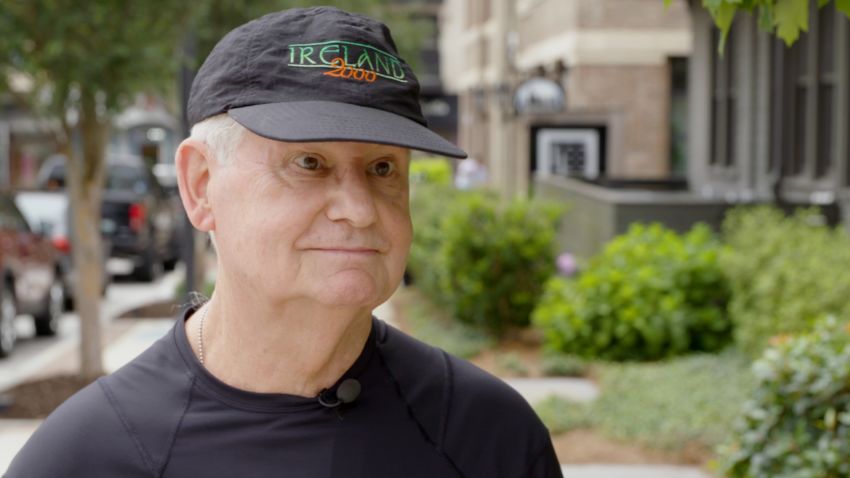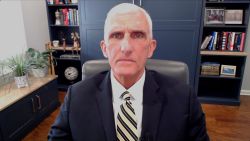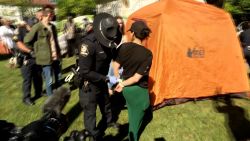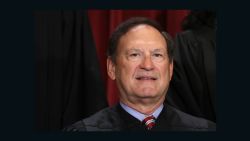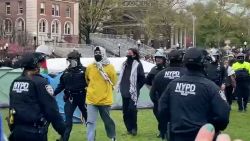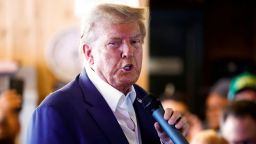An Atlanta-based grand jury has indicted Donald Trump and 18 others on state charges stemming from their efforts to overturn the former president’s 2020 electoral defeat.
The historic 41-count indictment unsealed Monday is the fourth criminal case that Trump is facing.
All 19 co-defendants must surrender by August 25 at noon, Fulton County District Attorney Fani Willis told reporters Monday after the indictment was released.
Trump and others “joined a conspiracy to unlawfully change the outcome” of the election, according to the indictment, which said they “unlawfully conspired and endeavored to conduct and participate in a criminal enterprise” after Trump lost the election in Georgia.
The charges, brought in a sweeping investigation led by Willis, cover some of the most egregious efforts by the former president’s allies to meddle in the 2020 presidential election. Unlike the election subversion charges brought by special counsel Jack Smith, Willis’ case will be insulated from any Trump meddling if he is reelected in 2024; he will not be able to pardon himself or his allies of any state law convictions, nor will he be able to dismiss the Fulton County prosecutors bringing the charges.
Many of the efforts that Trump and his allies spearheaded in Georgia resembled plots in other battleground states President Joe Biden won, but the Georgia-focused effort featured some of the most audacious gambits by the former president and his supporters.
“Trump and the other Defendants charged in this Indictment refused to accept that Trump lost, and they knowingly and willfully joined a conspiracy to unlawfully change the outcome of the election in favor of Trump,” the indictment states. “That conspiracy contained a common plan and purpose to commit two or more acts of racketeering activity in Fulton County, Georgia, elsewhere in the State of Georgia, and in other states.”
The indictment also included an additional 30 unindicted co-conspirators in addition to the charged defendants.
Willis, a Democrat, will undoubtedly face intense criticism from Trump and his allies, who have frequently sought to discredit officials investigating him by casting them as rogue political actors. Trump had already unsuccessfully sought to disqualify her, citing public comments she has made about the case.
Before the indictment was unsealed Monday, the Trump campaign accused Willis of “election interference” amid the 2024 GOP presidential nomination campaign
“The timing of this latest coordinated strike by a biased prosecutor in an overwhelmingly Democrat jurisdiction not only betrays the trust of the American people, but also exposes true motivation driving their fabricated accusations,” the statement said in part.
The charges
The grand jury approved charges against Trump for a violation of Georgia’s RICO law – or Racketeer Influenced and Corrupt Organization – which accuses Trump of being part of a broad conspiracy to attempt to overturn the election result.
The charges in the sweeping indictment include: False statements to and solicitation of state legislatures; false statements to and solicitation of high-ranking state officials; the creation and distribution of false electoral college documents; the harassment of election workers; the solicitation of Justice Department officials; the solicitation of then-Vice President Mike Pence; the unlawful breach of election equipment; and acts of obstruction.
“Defendant Donald John Trump lost the United States presidential election held on November 3, 2020,” the indictment states. “One of the states he lost was Georgia. Trump and the other Defendants charged in this Indictment refused to accept that Trump lost, and they knowingly and willfully joined a conspiracy to unlawfully change the outcome of the election in favor of Trump. That conspiracy contained a common plan and purpose to commit two or more acts of racketeering activity in Fulton County, Georgia, elsewhere in the State of Georgia, and in other states.”
A long-running investigation
Willis’ investigation started in early 2021, soon after a January call became public in which Trump pressured Georgia Secretary of State Brad Raffensperger, a fellow Republican, to “find” the votes necessary for Trump to win the state in the presidential election.
Republican control of the state legislature and executive branch made it a particularly ripe target for Trump’s pressure campaigns. His attorneys appeared before Georgia lawmakers on three occasions to push bogus claims of election fraud and the state was targeted with lawsuits making unfounded allegations of voter irregularities.
As part of his effort to overturn the election results, Trump also unsuccessfully pressured Gov. Brian Kemp, who is also a Republican, to abuse his powers. Both Kemp and Raffensperger rebuffed those efforts.
When the efforts failed, Trump urged Georgia state lawmakers to convene a special session to overturn Biden’s victory. Trump allies, including his attorney Rudy Giuliani, presented bogus claims of voter fraud to the state House and Senate. The Trump campaign, along with outside lawyers who supported their cause, filed meritless lawsuits that unsuccessfully tried to nullify Biden’s victory. And Trump tried to weaponize the Justice Department to help him intervene in the Georgia election, including by attempting to get agency officials to claim the election was “corrupt.”
The special purpose grand jury empaneled in Fulton County for the investigation wrapped up its work earlier this year. That panel is separate from the one that approved the charges on Monday.
The grand jury on Monday met for roughly 10 hours before handing up the 98-page indictment.
Beyond Trump, Meadows is highest ranking White House official charged
Beyond Trump, Meadows is highest-ranking White House official charged
Beyond the former president, White House chief of staff Mark Meadows is the highest-ranking White House official to be charged in the Georgia indictment, beyond the former president.
Meadows was notably absent among Trump’s six co-conspirators in the special counsel’s January 6-related indictment.
Meadows was ordered by a South Carolina judge to testify before the Georgia special grand jury, but a juror said earlier this year that he declined to answer questions invoking his Fifth Amendment rights against self-incrimination. Meadows did testify to the special counsel grand jury in Washington.
The former Trump chief of staff, like all 19 defendants, is charged in the Fulton County indictment with a violation of Georgia’s RICO law. Meadows is also charged with solicitation of the violation of oath of office by a public officer over Trump’s phone call with Raffensperger.
The indictment also describes Meadows’ attempt to enter into a space in Cobb County, Georgia, where 2020 election signatures were being audited, and a text message Meadows sent to the Georgia secretary of state’s chief investigator that stated, “Is there a way to speed up Fulton county signature verification in order to have results before Jan 6 if the trump campaign assist financially.”
This story has been updated with additional details.
CNN’s Jared Formanek, Fabiana Chaparro, Morayo Ogunbayo, Macie Goldfarb, Shirin Faqiri, Jim Rogers, Heather Law and Eli Masket contributed to this report.





